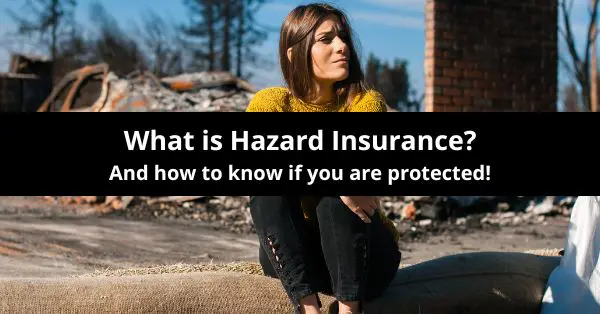Hazard insurance is an insurance policy that protects a property owner against damage to their home or property caused by fires, severe storms, hail, sleet, or other natural events. Hazard insurance is part of a homeowners insurance policy, but not all homeowners policies cover natural disasters. The homeowners insurance policies that have hazard insurance sections may not cover all hazardous events. This is why it is important to check your homeowners insurance policy.
When looking through your homeowners insurance policy, look to see which hazards are and are not included, how much compensation you may receive if a natural disaster occurs, and learn how to get better coverage specific to the events that occur in your region. But before we jump into how to increase your hazard insurance protections, lets look at the differences between homeowners and hazard insurance policies.
The Differences Between Hazard Insurance and Homeowners Insurance
Both insurance types protect your home, but they are not equal. The table below has the main differences between the two, but that does not mean it matches your specific policy. Read through your homeowners and hazard insurance policy before assuming you are covered.
| Hazard insurance | Homeowners insurance | |
| Protects dwellings and structures | X | |
| Replaces your personal property and belongings | X | |
| Covers loss of use | X | |
| Offers you liability coverage | X | |
| Pays medical bills from event | X | |
| Rebuilds your home | X | X |
| Repairs your home | X | X |
As you can see, homeowners insurance is a broad policy that includes coverage for other items like personal belongings and general liability. If a tornado damages your home, your hazard insurance policy would pay for the cost to repair/rebuild your home but would not pay to replace your belongings that are lost or destroyed.
Common hazards covered by hazard insurance include:
- Fire/smoke damage
- Hail damage
- Volcanic eruption
- Wind damage
- Lightning damage
- Damage from snow, ice or sleet
- Damage from vehicles (cars, aircraft, etc.)
- Fallen trees
- Damage caused by heating or AC units
- Explosions
- Power surges
Although this looks like a lot of coverage, it does not mean it is in your policy, and not everything will be covered. The most common hazard insurance exclusions are usually large-scale disasters, damage due to negligence or normal wear and tear, and inherently risky items like trampolines. For these types of things, you will need to purchase additional coverage to protect yourself.
There are also specific natural disasters and events that are not typically covered by hazard insurance. These events can be split into two categories: events that are too massive for the insurance company to cover, and those caused by negligence or through the course of normal wear and tear.
Events typically not covered by hazard insurance include:
- Floods
- Earthquakes, sinkholes and other “earth movements”
- Acts of war
- Acts by the government (such as seizure or eminent domain)
- Nuclear accidents
However, if a non-covered disaster causes damage that is covered, like an earthquake causing a fire, your hazard insurance may still pay for repairs. This is on a case by case basis and based on your policy. You can also buy a catastrophic hazard insurance that specifically covers natural disasters like earthquakes, hurricanes, and floods which is especially helpful in states like Florida and California.
And natural disasters aren’t the only exclusions from a hazard insurance policy. A lack of upkeep which leads to hazardous conditions may not be covered either including:
If you don’t have coverage, cannot afford the repairs, or cannot afford an upgrade to your hazard insurance policy; your best option may be to sell your house. If finding a traditional buyer does not work, we buy houses companies like ours are always an option to look into.
While your yard may love the rain; your home will not enjoy the hail, wind, and lightning that can accompany a rain storm. If you live in an area prone to natural disasters, or you have a home that is susceptible to the issues above, read your hazard insurance policy to see if you’re covered. And if you cannot get the right coverage or find a buyer, call us at to find out how much you could get by selling your house to us.


